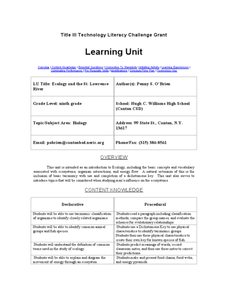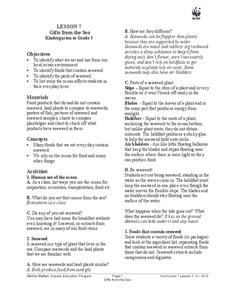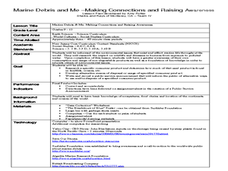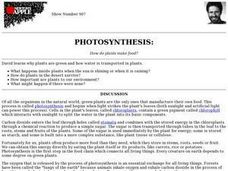Virginia Department of Education
Go with the Flow
How does nature's hierarchy relate to our local human environment? Answer this question, along with others, as the class visually depicts the natural hierarchy provided by nature. Pupils discuss each piece of the pyramid and its energy...
Pace University
Grades 6-8 Ecology
Why are our national parks important? Scholars research the national parks and explore the basic ecology of these areas in a differentiated instruction unit on ecology. They learn about ecosystems, food chains, symbiosis, and biomes. The...
Curated OER
Ecology and the St. Lawrence River
Ninth graders complete a unit of lessons on ecosystems, organism interactions, and energy flow. They create a key for known species of fish, diagram the movement of energy through an ecosystem, and create and present food chains and food...
NOAA
Ocean Primary Production
A cold seep is an area on the ocean floor where hydrocarbons leak from the earth, creating entire unique biomes. Learners explore cold seeps, photosynthesis in the ocean, and its limitations due to loss of sunlight. They further explore...
Curated OER
Circle of Life
Students consider why we eat and where our food obtains its energy. They illustrate food chains that might be found on an open field, dissect owl pellets, identify the remains of animals in the pellets, watch videos and participate in...
Curated OER
Sharks
Pupils research sharks, the food chain, and the water habitat shared by humans and sharks.
Curated OER
Gifts from the Sea
Young scholars discover the oceanic food chain. In this healthy eating lesson, student investigate the fish we eat and the food the fish eat. Students discover what ocean animals eat seaweed and what everyday foods we eat that also...
Curated OER
Food and You
Students identify why humans are dependent on natural resources and the problems associated with their use and demonstrate how humans affect their environment. They also describe the different components and natural resources that go...
Curated OER
Food or Fuel?
Students describe the process of transesterification utilizing chemical formulas. They construct and compare models of chemical structure of the substances involved in biodiesel production such as: alcohols, alkenes, alkanes, alkyls,...
Curated OER
Who's for Dinner?
Fifth graders examine life systems within different biomes. They choose paper plates with the names of animals on them. They research the animals, write reports and draw pictures of them. They create a food chain model by arranging the...
Desert Museum
Daisy Ecology
Here's a fine lesson plan that combines poetry with life sciences. Learners carefully listen to a poem that's all about a food chain. As the poem is read, learners name the producer, the herbivore, the carnivore, and the omnivore. Lots...
Curated OER
Secrets of the Ocean Realm - Survival in the Sea
Students determine the sequential links in a marine food chain and identify the roles that various organisms play in this chain. Students develop charts as visual aids for illustrating marine food chains.
Curated OER
Lower the Trans and Increase the Omega-3s
Students identify the health risks associated with trans fats. In this adult health lesson, students examine food labels for hydrogenated oils content. They discuss the benefits and sources of omega-3s.
Curated OER
Marine Debris and Me
Students study the environmental issues that pertain to the marine environment. In this research ocean landfills lesson students come up with alternative means of disposal.
Curated OER
"From farm to plate"
Students identify sources of food and the bacteria associated with them. They comprehend how bacteria in the food chain can cause disease. Students comprehend the importance of proper food-hygiene practices throughout the many stages of...
Curated OER
How Far Did It Travel?
Sixth graders read and discuss background and vocabulary. They use the background to develop a flow chart showing the movement of food from farm to table and work independently or in groups to complete an activity. They then use Internet...
Curated OER
Photosynthesis: How do plants make food?
Students study why plants are green and how water is transported in them. They examine how plants respond to different amounts of light.
Curated OER
March Market
Students role play a living wetland food web. They trace the food web associated with the items in their lunch.
Curated OER
Amphipod Ecology
Students count amphipods under kelp wracks of varying ages to explain how long it takes for them to find their food source. They collect and represent the data.
Curated OER
Track the Path of Coffee From Farm to Store Shelf
Students investigate the cultivation and marketing of coffee. In this global studies lesson, students consider the connections of the 21st century world as they explore how coffee makes it from farms to their homes. Students consider the...
Curated OER
Science Videos
Students plan, practice, and act in a 2-3 minute videotaped production about a specific topic. Students from a local high school give presentations pertaining to seasons, earth rotation, and moon phases. Students analyze the...
Curated OER
The Red Kangaroo: An Outback Survivor
Students watch an episode of "Nature" about the "Big Red Roos." They create food chains and webs based on the information they've researched on the red kangaroos. They write an editorial on the topic of the killing of kangaroos in the...
Curated OER
Rain Forest Adventures
Young scholars discover locations of the world's rain forests. Once they identify the animals, plants, products, and resources located in them, they construct they own rain forest terrariums. By comparing and contrasting the two types...
Curated OER
Plastics by the Numbers
High schoolers investigate plastic resins and their uses. In this plastics lesson plan, students describe major plastic resins and what they are used for, they compare and contrast the properties of plastic resins and they list products...




